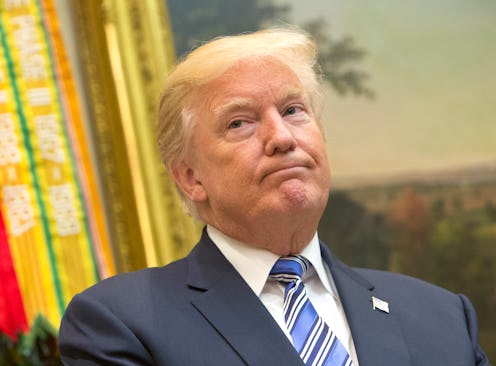News
Why Didn't Trump Call Charlottesville Terrorism?

This weekend, far-right demonstrators arrived in Charlottesville, Virginia to protest the removal of a Confederate monument. It quickly became clear it was about more than that. In fact, the "Unite the Right" rally on Saturday saw white nationalist, white supremacist, and outright neo-Nazis marching through the streets of Charlottesville, and it culminated in an apparent act of lethal violence, as somebody drove a car directly into a thick of anti-racism counter-protesters, reportedly injuring 19 and killing one. Which raises a compelling question: Why didn't Donald Trump call Charlottesville terrorism when he's so quickly leapt to say so about other acts of chaotic violence?
While it's not possible to crawl inside the president's head, there's one pretty simple potential answer, and if you're a progressive or one of the president's critics, you probably already know where this is going.
Namely: when Trump either knows or has reason to think an attacker is non-white and/or Muslim, and therefore believes it's in his political interests to be get aggressive about it, he jumps to conclusions very quickly, and names exactly what he believes the culprit to be very explicitly.
When the political realities aren't so favorable to him, on the other hand ― such as when a mosque is attacked, or when a racist Oregon man fatally stabs two people on a Portland metro train ― he typically stays silent, either offering no public comment, or heavily qualified ones that come far too late.
To play devil's advocate: You could look at this as a case of a president exercising restraint in the face of uncertain facts ― it's true, for instance, that the police have not yet identified the motive of the person who plowed their car into the demonstrators, although some eyewitnesses have already claimed it was an intentional act of lethal violence.
But that explanation doesn't hold water, thanks to Trump's extreme haste to declare things terrorism when he's got a reasonable assurance of the religion and skin color of the perpetrators ― like his responses to last year's Pulse nightclub shooting in Orlando, Florida, or to San Bernardino, or to London in June.
To say nothing of when he wrongly identified an arson incident at a casino in the Philippines as terrorism back in June, a remark that reportedly elicited laughter from some of his intelligence officials. Or when he swiftly ― and once again, wrongly ― blamed terrorism for the hijacking of an EgyptAir flight, when the actual motivations of the hijacker had nothing to do with inciting terror.
Contrast this against another notable instance where he failed to call something terrorism ― when a white gunman, reportedly himself a Trump supporter, shot up a mosque in the Canadian province of Quebec. Simply put, he's done this sort of thing a lot, and he hasn't been that subtle about it.
Furthermore, Trump repeatedly attacked both former president Barack Obama and former Democratic nominee Hillary Clinton for failing to identify acts of violence by Muslims or militant Islamic groups as "radical Islamic terror." Given an opportunity to denounce white supremacist terror, however, he decided to pass.
In short, while it's impossible to say for a certainty, the simplest answer is sometimes the one most likely to be correct. In both word and deed, Trump hasn't given anyone any reason to doubt that his snap reactions to these sorts of incidents are rooted in race, religion, and politics more than any sense of factual accuracy or morality.